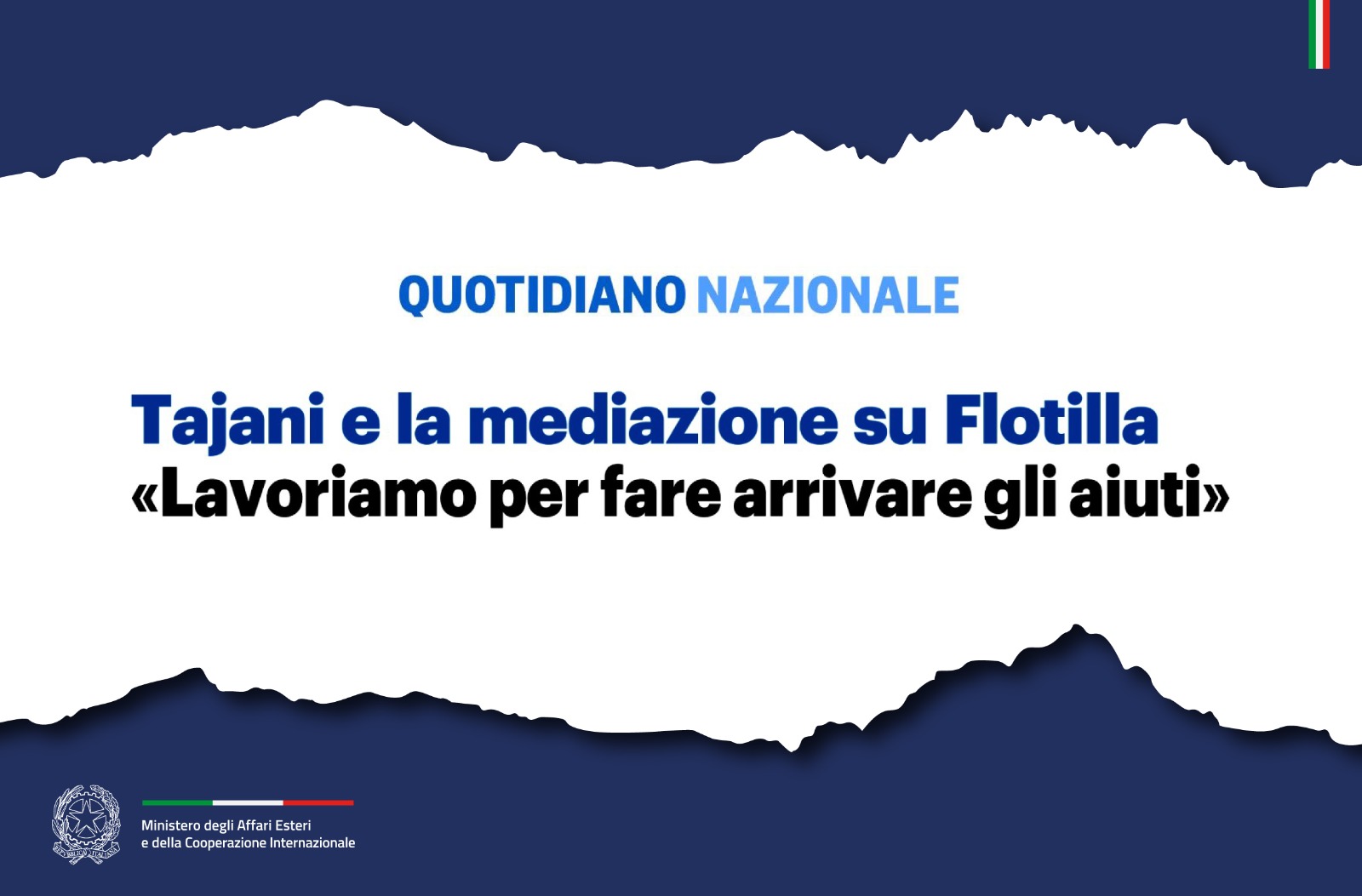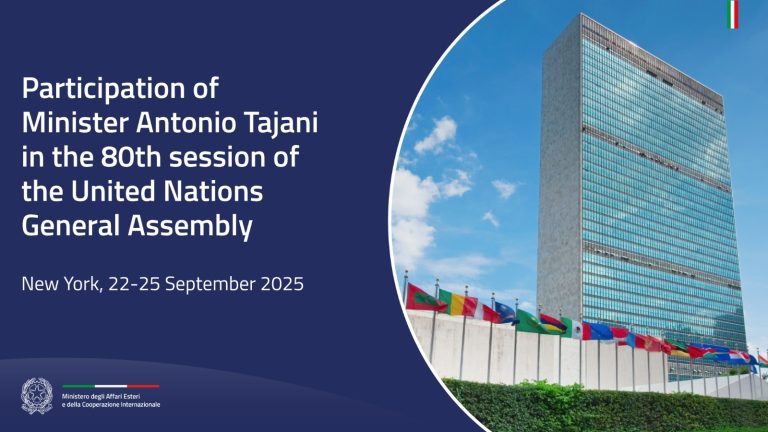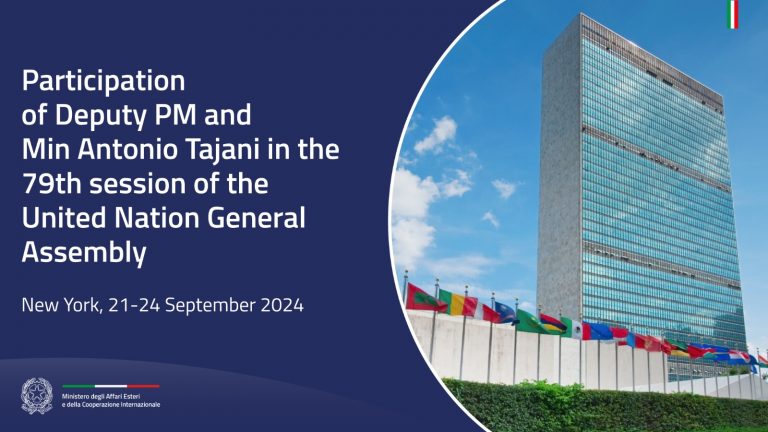ROME – “We are engaged and currently working on a proposal for mediation with Israel, with the support of the Government of Cyprus. If accepted, this proposal would allow aid from the Flotilla to reach the Palestinian people,” said Deputy Prime Minister and Minister of Foreign Affairs, Antonio Tajani, speaking from New York, where he is attending the UN General Assembly. “The plan foresees the delivery of the aid to Cyprus, from where it would be transferred to the Latin Patriarchate of Jerusalem. From there, it would be sent on to Israel, with guarantees from the Israeli government to allow its entry into Gaza”.
Minister Tajani, regarding the Middle East, you are also working—under certain conditions—towards recognising the State of Palestine.
“Italy supports the recognition of Palestine because we firmly believe in the two-state solution: two states for two peoples, Israelis and Palestinians. We are prepared to move forward with recognition soon, but we cannot recognise a state that includes Hamas in its governing structures. The hostages must be released, and Hamas must be excluded from any form of government. We have always supported the two-state solution. Even here in New York, our work continues in favour of peace and the reconstruction of Gaza. Israel must stop its attacks. It must halt military operations: we are ready to approve sanctions proposed by the European Commission and are evaluating possible financial sanctions”.
On the Russian-Ukrainian front, Moscow has dismissed any prospects for peace or a ceasefire: the conflict is set to continue.
“This is what we have always said: at present, Russia is not interested in peace. But eventually, it will have to realise that its actions will only lead us to strengthen sanctions. It seems clear to me that even the patience of the United States is running out”.
In Europe, however, Russian provocations are on the rise.
“These are attempts to test our response. I do not believe President Putin seeks a third world war. Rather, I think he wants to strengthen his position in the region and is trying to gauge Europe’s and NATO’s reactions. These are provocations that will certainly be rebuffed. Similar episodes occurred during the Cold War as well. We must avoid escalation, but firm signals of deterrence are necessary”.
Turning to Italy: on Sunday, elections will be held in the Marche region, followed by other key regions. What is at stake in the upcoming vote?
“We believe that good centre-right governance in the Marche can be further strengthened. Within that framework, we believe Forza Italia’s contribution to supporting President Acquaroli has been appreciated. More generally, I am confident that polling trends—which show Forza Italia gaining significant ground—will be confirmed. We are optimistic about the outcome. This would affirm stability and balance, creating space for a centrist force that guarantees sound governance”.
Are you also expecting strong results in Calabria and other regions?
“In Calabria, we have submitted three Forza Italia lists, a sign of the party’s excellent health. The same applies to Valle d’Aosta, where the climate is very favourable to us. There is, in short, a demand for centrist politics—especially in these times of great national and international tension—offering a stabilising, credible, and serious alternative. There is a desire for a political force that can bring reassurance: a centre-right party that reinforces the coalition with its own identity and political action”.
When will you announce presidential candidates in the other regions heading to the polls?
“We are ready to do whatever is necessary to put forward candidates. We have never obstructed the process—quite the opposite—we are ready to decide as soon as possible. I expect that upon my return from New York, at the beginning of next week, we will be in a position to announce our candidates. In Campania and Apulia, we are supporting a civic candidate. We already have names in mind and have shared them with our allies. In Veneto, we have no prejudices against anyone. We want to win and govern effectively, but we will not accept being marginalised as we have been until now—we intend to play a leading role in the region’s administration. I am also very confident about our performance in Tuscany: we have mobilised across all levels, with a positive message of renewal”.
At the weekend in Telese, you will launch what some are calling the “new” Forza Italia. On what basis?
“Telese will send a strong message of Forza Italia’s identity, as we present our ‘Manifesto of Freedom’, alongside a selection of leading historical figures who are guiding references for our movement. It will be an event rooted in identity, both culturally and politically, aiming to strengthen our role and to show clearly that we are a political force with a Christian, liberal, reformist identity, committed to civil liberties and legal safeguards, Atlanticist, and pro-European. We are allies of Fratelli d’Italia and the League, but we are a distinct party, with our own identity and history”.
Who will be included in this Pantheon?
“Naturally, Silvio Berlusconi. Alongside him will be key figures such as De Gasperi, Adenauer, Schuman. Also, Salvo D’Acquisto, Carlo Alberto Dalla Chiesa, Rocco Chinnici. Gaetano and Antonio Martino, Luigi Einaudi. Spiritual figures like Padre Pio, John Paul II, Pope Benedict XVI, and Don Giussani. Literary and symbolic icons such as Dante Alighieri, Ulysses and Penelope. And many others”.
So, will a new Forza Italia emerge from Telese?
“Our values remain unchanged, but the world has changed—and this requires us to respond to new challenges in a new way. This is what we intend to do with our new ‘Manifesto of Freedom’, which places the concept of freedom—in all its forms—at the very heart of our political project”.



